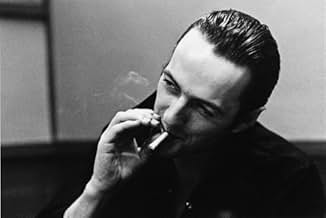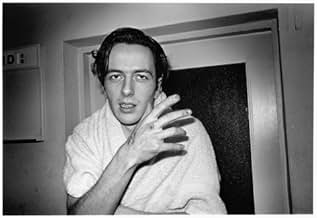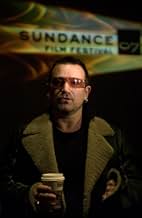IMDb RATING
7.5/10
4.4K
YOUR RATING
As the front man of the Clash from 1977, Joe Strummer changed people's lives forever. Four years after his death, his influence reaches out around the world, more strongly now than ever befo... Read allAs the front man of the Clash from 1977, Joe Strummer changed people's lives forever. Four years after his death, his influence reaches out around the world, more strongly now than ever before.As the front man of the Clash from 1977, Joe Strummer changed people's lives forever. Four years after his death, his influence reaches out around the world, more strongly now than ever before.
- Awards
- 1 win & 4 nominations total
Joe Strummer
- Self
- (archive footage)
The 101ers
- Themselves
- (archive footage)
Brigitte Bardot
- Self
- (archive footage)
Mark 'Bez' Berry
- Self
- (as Bez)
Big Audio Dynamite
- Themselves
- (archive footage)
The Clash
- Themselves
- (archive footage)
Peter Cushing
- Winston Smith
- (archive footage)
Featured reviews
What a documentary film that made by Julien Temple, Filmmaker Julien chronicles the transformation of a self-described "mouthy little git," born John Mellor, into an anti establishment icon known to the world as Joe Strummer. In his latest documentary, Temple uncovers the myth behind the front man of the seminal punk band the Clash. Through previously unearthed interviews with Strummer himself and recollections of those who knew him best, Temple reveals a complex man who used his music as a bullhorn for his conscience-as well as a means to educate others about the injustices of the world. The film includes live concert footage spanning Strummer's career and tapes of his BBC radio program, all of which provide a fitting soundtrack to his distinctive and storied existence. The performance footage would be fascinating on its own, but Temple probes beyond Strummer's mystique to reveal a person with his own flaws who could sometimes be idealistic to a fault. Temple has created a thoughtful and poignant portrait of a man many think they knew. 'Joe Strummer: The Future Is Unwritten' provides a rare glimpse into the man behind the legend of "punk rock warlord." There are personal interviews with some of the surviving members of The Clash, as well as with people like Bono and John Cusack that are very personal, and serve the film well. They don't stand out as "Look! We've stuck a celebrity in here!" Temple uses a campfire setting for most of these interviews, and given the fact that Strummer used to Organize large campfire celebrations before he died, it's only fitting. One thing for certain is that the Joe Strummer we see at the campfires is a much more approachable and likable figure than the Strummer who avoids confrontations and has other people fire band members during the heyday of The Clash.
Joe Strummer: The Future is Unwritten is maybe the first time one has seen a documentary done a "punk rocker" like this, where it's a story of the ups and downs and valleys and little peaks for a rock star done in the style of Eisenstein caught in the midst of a room covered with punk garb and an assistant with a mohawk. It mixes archival footage, interviews, movie footage from Animal Farm and 1984, Peter Cushing movies and Raging Bull, as well as a kind of loose structure formed out of 'London Calling' radio clips that Strummer did with his own music choices for his audience, and it's a mix that the suits the director wonderfully. His previous film was a revisionist take on the Sex Pistols- maybe the masterpiece of punk-rock docs, the Filth and the Fury- and the Future is Unwritten comes just as close to the subliminally, anger, trouble, and creative spirit that went with its subject matter.
Can anyone completely know Joe Strummer? Probably the same could go for Bob Dylan, who also has a movie about him out now that stretches the boundaries of cinema in I'm Not There. Temple raises questions for the fans of the Clash who might've not known certain things; that Strummer could be a very generous front-runner to the fans that needed help, and could also get p-od if his audience wasn't in some check with himself (or rather that they could be connecting with the audience and not some abstract rock-blob, which they feel they become by the time of Shea stadium); that towards the end of the Clash it was just Strummer and his management team (!); that Strummer anguished for the better part of a decade over how his career would go- this part I did know- that he went into some movies, made a horrible effort to get out of his record contract, and drifted in the tide of experiencing whatever for inspiration. His tale is more enigmatic than most, but as any artist he was many things at any time: moody to a fault, pushy, pleasant, quiet, frustrated, quixotic, and always with ideas that could come from anywhere, from Central American rebel uprisings to his walk from one place to another.
It is, more often than not, a sad film, probably more-so than the destructive tome on the Pistols, because Temple brings up many 'what-ifs', and a lot of the loneliness that could encompass Strummer (i.e. the scene when he's recording for days on end by himself in the studio shows him frayed and frazzled, as he sometimes appears in interviews too) and carried around him with, as any major rock and roll personality has, a rotten past and family history (father, brother, et all). But all those moments when Temple gets the audience to really feel the weight of the fact that such a man has been gone for good for five years now, he also reminds us brilliantly what he DID accomplish. There is a mark left from him, on his fans and on his loved ones and on the likes of Bono and Scorsese and (as funny as it is to see him Jack Sparrow-ed up) Depp, not to mention practically any *good* punk band.
Strummer was a thinking-man's punk, one who's lyrics could be taken into context of political and social significance, and had the stamina- along with his rowdy band-mates- to try and do what few rock bands could ever do: make a significant impact on consciousness, as if it were intuitive to do so. That they were eclectic didn't hurt either (even if, arguably, the Clash were more significant than the Mescaleros could ever be). And, in the end, the Future is Unwritten is mandatory viewing for anyone who gave a g*damn about the Clash or about the progression of the creative forces that started, actually, in folk and hippie music, progressed through punk, and went back out again into techno and, gasp, hippies and punks combined! It's daring for what's in-between the lines of the typical rock and roller story, and how Temple and his team make one of the best edited films of the year.
Can anyone completely know Joe Strummer? Probably the same could go for Bob Dylan, who also has a movie about him out now that stretches the boundaries of cinema in I'm Not There. Temple raises questions for the fans of the Clash who might've not known certain things; that Strummer could be a very generous front-runner to the fans that needed help, and could also get p-od if his audience wasn't in some check with himself (or rather that they could be connecting with the audience and not some abstract rock-blob, which they feel they become by the time of Shea stadium); that towards the end of the Clash it was just Strummer and his management team (!); that Strummer anguished for the better part of a decade over how his career would go- this part I did know- that he went into some movies, made a horrible effort to get out of his record contract, and drifted in the tide of experiencing whatever for inspiration. His tale is more enigmatic than most, but as any artist he was many things at any time: moody to a fault, pushy, pleasant, quiet, frustrated, quixotic, and always with ideas that could come from anywhere, from Central American rebel uprisings to his walk from one place to another.
It is, more often than not, a sad film, probably more-so than the destructive tome on the Pistols, because Temple brings up many 'what-ifs', and a lot of the loneliness that could encompass Strummer (i.e. the scene when he's recording for days on end by himself in the studio shows him frayed and frazzled, as he sometimes appears in interviews too) and carried around him with, as any major rock and roll personality has, a rotten past and family history (father, brother, et all). But all those moments when Temple gets the audience to really feel the weight of the fact that such a man has been gone for good for five years now, he also reminds us brilliantly what he DID accomplish. There is a mark left from him, on his fans and on his loved ones and on the likes of Bono and Scorsese and (as funny as it is to see him Jack Sparrow-ed up) Depp, not to mention practically any *good* punk band.
Strummer was a thinking-man's punk, one who's lyrics could be taken into context of political and social significance, and had the stamina- along with his rowdy band-mates- to try and do what few rock bands could ever do: make a significant impact on consciousness, as if it were intuitive to do so. That they were eclectic didn't hurt either (even if, arguably, the Clash were more significant than the Mescaleros could ever be). And, in the end, the Future is Unwritten is mandatory viewing for anyone who gave a g*damn about the Clash or about the progression of the creative forces that started, actually, in folk and hippie music, progressed through punk, and went back out again into techno and, gasp, hippies and punks combined! It's daring for what's in-between the lines of the typical rock and roller story, and how Temple and his team make one of the best edited films of the year.
10vez_kirk
Wow, I was blown away by this film. Despite having been born in 1990, and not having got into punk 'til 1 1/2 years after Joe's death (something I'm constantly kicking myself for), this film made me feel involved in his life + the '70s punk scene, as though I actually lived it. That's the sign of a pretty feckin' good film, if you ask me.
I found the format to be fantastically original (everything from having Joe 'narrate' through his radio show, to the use of his cartoons and the campfire interviews), the content was thorough but not overly concerned with trivial details, and it was just generally a warm, involving + insightful portrayal of Joe's life and the British punk scene.
Fantastic. See it.
I found the format to be fantastically original (everything from having Joe 'narrate' through his radio show, to the use of his cartoons and the campfire interviews), the content was thorough but not overly concerned with trivial details, and it was just generally a warm, involving + insightful portrayal of Joe's life and the British punk scene.
Fantastic. See it.
I absolutely love The Clash and, because I liked Temple's film about the Sex Pistols, I had high hopes for this. Like many other people, I found the campfire interviews completely unsatisfying, especially since none of the subjects are identified at all. We hear very little from Mick Jones and not all from Paul Simonon. On the other hand, we are treated to John Cusack and a pirate-costumed Johnny Depp. Matt Dillon shares a fascinating anecdote in which he recounts something a taxi driver once told him about Joe Strummer, and Anthony Kiedis tells us that Joe hired someone who used to drum for him. Gosh! If any of these people knew Joe in a meaningful way, they don't make that clear on screen. Why Bono and not Billy Bragg talking about Joe's political effect on his own music? Perhaps Julien Temple is hopelessly starstruck. The film's only redeeming features were the home movies, photographs, live performances and excerpts from Joe's BBC radio show.
This film is not worthy of the man who inspired it. I will keep my fingers crossed that another filmmaker, one who favours substance over style, will some day make the definitive Joe Strummer documentary.
This film is not worthy of the man who inspired it. I will keep my fingers crossed that another filmmaker, one who favours substance over style, will some day make the definitive Joe Strummer documentary.
Julian Temple -- who filmed the Clash at one of their earliest rehearsals -- has assembled a truly impressive array of footage, including 8mm family films from Joe's childhood and a performance from the 101ers, his pre-Clash R&B/pub-rock band. There are interviews with Joe's squat-mates from the early 70s, Mick Jones and Topper Headon of the Clash, and numerous other people (musicians and other) who either worked with Joe or were influenced by him. My only reservation is that the movie might be overwhelming to someone who was unfamiliar with Strummer's work, or the broad outlines of his history, but I think even a complete novice would have to come away impressed by the sheer scope of Joe's legacy, both in terms of music and the influence he left on his friends and admirers.
Did you know
- ConnectionsFeatured in 'Joe Strummer': The Importance of Fire (2007)
- How long is Joe Strummer: The Future Is Unwritten?Powered by Alexa
Details
Box office
- Gross US & Canada
- $248,362
- Opening weekend US & Canada
- $20,880
- Nov 4, 2007
- Gross worldwide
- $1,193,491
- Runtime
- 2h 4m(124 min)
- Color
- Sound mix
Contribute to this page
Suggest an edit or add missing content






































